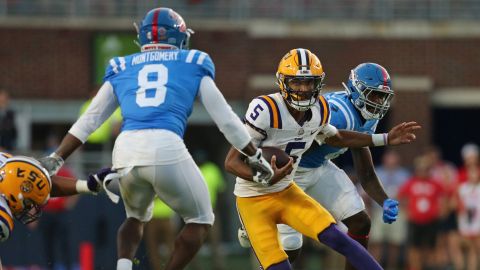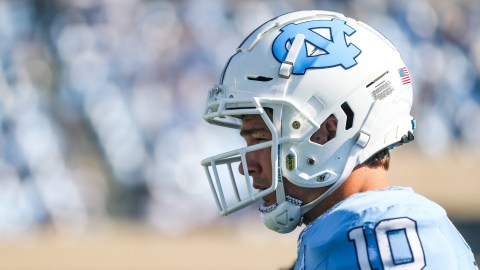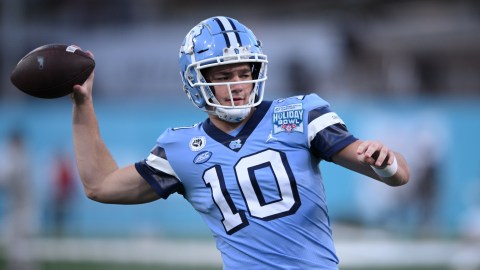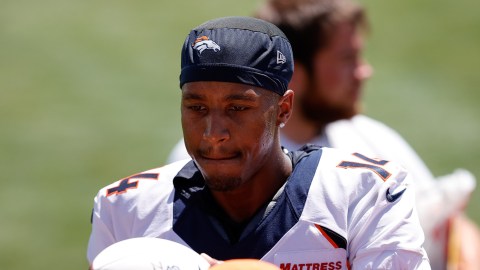Man, the New England Patriots sure look like dummies. But what, if anything, did they mess up, exactly?
Everyone from the northernmost tip of Maine to the southern coast of Rhode Island was scratching their heads Sunday afternoon when Patriots captain Matthew Slater elected to kick off to open overtime against the New York Jets. Tom Brady had just rallied the Pats to tie the game in the fourth quarter, and it seemed clear coach Bill Belichick would want the ball for his future Hall of Fame quarterback to march down the field for a game-winning touchdown on the opening drive.
Instead, the Patriots kicked the ball away, and if fans were confused, they weren’t alone. Even Slater, who said he confirmed three or four times with Belichick that the Patriots wanted to kick off, looked flummoxed as well. Slater apparently was under the impression that if he elected to kick, he got to choose which end zone to defend, as the game broadcast seemed to capture him saying, “We want to kick, that way.”
Unfortunately for the Patriots, that’s not the way it works.
Missing from much of the Monday morning consternation of whether the Patriots should have kicked off is just what the procedure was and where the breakdown occurred. Most fans assume the coin toss is a simple matter of kick versus receive, but the team that wins the coin toss actually has as many as five options.
There are four options a team can actively make:
- Kick off
- Receive the ball
- Defend the East end zone
- Defend the West end zone
Alternatively, a team can choose to save its option for later:
- Defer the choice (only available on pregame coin toss or playoff overtime coin toss)
A good deal of early jokestering on Twitter immediately following Slater’s flub was that the Patriots are so used to kicking off after winning the pregame coin toss, it was an instinctive reaction for him to say “kick.” Belichick even has a history of letting the other team have the ball to begin overtime. Yet “kick” probably isn’t (or shouldn’t be) even part of the Patriots’ coin-toss vocabulary, because if they elect to “kick,” they have spent their choice on kicking off, therefore losing the right to choose any of the other options, including an end zone to defend or to receive the kickoff coming out of halftime.
If you watch a lot of college football, you see a similar mistake at least every other season or so. The most recent notable occurrence came last season between Texas and UCLA. After winning the pregame coin toss, the Longhorns chose to “kick.” When the option reverted to UCLA coming out of the half, the Bruins chose to “receive” — thereby giving them the ball to begin both halves.
Now, in Sunday’s instance, Slater didn’t have the option to defer, but his error was related to the kick/defer confusion: By saying the word “kick” before specifying a direction, Slater opted to use his privilege by kicking off, and from Rule 4: Game Timing, Section 2, Article 2 of the NFL rulebook, “a captain’s first choice … is final and not subject to change.” The Jets therefore got the ball (i.e. the opposite of Slater’s “kick” choice), plus their option of end zone.
As if the whole thing needed to be confused further, the overtime coin toss gets an added wrinkle in the playoffs: When a team wins the toss to begin overtime, it can choose kick/receive or east/west, as in the regular season, but like the pregame coin toss winner it also can choose to defer. In this case, it’s deferring the option to the start of the third overtime — assuming there is one — just as though it’s the start of the “second half” of a regulation game.
Isn’t parsing the intricacies of the NFL rulebook fun?
None of this is meant to judge whether the Patriots’ decision to kick was right or wrong, or to cast blame if there was indeed a breakdown in communication between Belichick and Slater, or to engender the conspiracy theory that the Patriots tanked the game to jeopardize the Pittsburgh Steelers’ playoff hopes. It simply serves to explain the somewhat unnecessarily convoluted procedure and how confusion is possible — perhaps even inevitable — when not even the people on the field know all the specifics.
Thumbnail photo via Ed Mulholland/USA TODAY Sports Images



